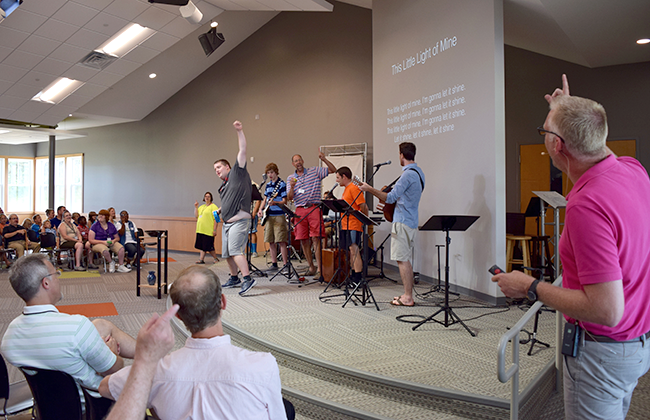How alpacas and a warm welcome helped shape a new church’s vision for ministry.
On a sprawling campus in Holland, Michigan, Benjamin’s Hope offers an intentional community, programs, and worship for adults who have autism and other developmental disabilities. But over the past year, the organization has also offered both hospitality and a new perspective to members of The Foundry, an RCA church plant from neighboring Zeeland.
Last year, when The Foundry was ready to move out of its parent church’s gym, Foundry pastor Eric Folkers found himself at the Benjamin’s Hope campus. Folkers was reconnecting with his mentor, Eric Peterson, pastor of The Church of Benjamin’s Hope. What he didn’t know was that Benjamin’s Hope was in the process of building a multipurpose center that would eventually host the organization’s worship services.
As Folkers toured the campus, a light bulb went on: The Foundry needed a place to worship while their permanent building was under construction. Benjamin’s Hope was about to open a space well suited for worship. Yes, their worship styles were different. Yes, Benjamin’s Hope had a petting zoo and other features unusual for a church. But both Folkers and Peterson saw the value in doing ministry together.
“[This partnership] was important because our church was brand new and our DNA was—and still is—not fully set, so we needed to experience nonparental hospitality,” says Folkers. “The Foundry was moving out of our parent church [Vriesland Reformed], where we had been born and that had been our only home up to this point. When we moved into Ben’s Hope it was like moving in with your fun uncle who has a nice place and a few alpacas to hang out with. They taught us about selfless hospitality and having a spot for everyone at the table.”
That summer and through the fall, Benjamin’s Hope residents and Foundry members worshiped side by side every week. The excitement was evident from the beginning, but both pastors acknowledge there was a brief adjustment period as Foundry members learned to expect and celebrate the individual expressions of worship from people around them who had disabilities.
“Once we got over our preconceived ideas of how to act, we had an amazing summer together,” says Folkers. “One of my favorite memories was our greeting times—we had to allow five to seven minutes for everyone to greet each other because our friends at Ben’s Hope were not going to exclude anyone!”
In time, The Foundry’s building was completed, and the church moved from Benjamin’s Hope into their new home. But their months of worship together solidified a partnership that continues to grow, despite the physical separation.
“Eric [Folkers] and I meet most every week to share and dream about having an inclusive worship gathering on site at The Foundry,” says Peterson. “These dreams are blurring the lines of ‘ownership’ and are more about reaching people for God’s glory, utilizing the resources that both of us bring.”
Peterson says Benjamin’s Hope has been inspired by The Foundry’s rapid growth and the importance the church places on identifying and developing leaders. He currently serves on the classis oversight board for The Foundry and is excited about how this second “all abilities” service could continue to change them as a congregation.
As for The Foundry, Folkers says their relationship with Benjamin’s Hope came at exactly the right time to be incredibly transformational for the young church.
“[Benjamin’s Hope] showed us and everyone who comes to their campus what it means to welcome everyone,” says Folkers. “And ‘welcoming the stranger’—that is The Foundry’s stated goal, going out to reach the unchurched or those who have left the church. They showed us what our desired DNA looked like in real time and in real actions.
“The lessons we learned there have formed us and are part of our planting DNA as we go forward. Without Ben’s Hope, we are not The Foundry.”





